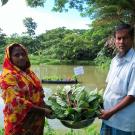Abstract: Wetland agriculture on various types of floating gardens has been used for centuries in many countries. Bangladesh is a low‐lying country that suffers from seasonal floods during the rainy season that render land unsuitable for growing fruits and vegetables for extended periods of time. Widespread small‐scale fish farming and large freshwater lakes in rural areas also significantly reduce the land available for cultivation. We have designed an innovative floating garden constructed from locally‐available materials that allows small‐scale fish farmers to grow horticultural crops on their ponds. The garden comprises a bamboo ‘raft’ containing a soil‐less medium of coconut coir and vermicompost. Flotation is provided by empty second‐hand plastic containers attached to the bottom of the raft. Pest‐exclusion nets and Neem extracts can be used to reduce insect infestations. A range of horticultural crops have been successfully grown on the gardens, and we are presently monitoring the impact of the gardens on family nutrition and income of rural families. The gardens also provide a location for producing seedlings that can be transplanted into ground beds when the floodwater recedes. This allows farmers to obtain higher prices due to the early‐season production. We are continuing to determine the horticultural and financial constraints of crop production in these novel gardens.
Angelos Deltsidis presented this poster at the International Symposia on Tropical and Temperate Horticulture, Novembre 2016 at the Cairns Convention Centre, Australia.

